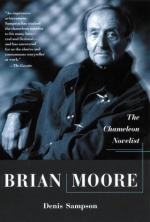|
This section contains 792 words (approx. 3 pages at 300 words per page) |

|
During the last ten years Brian Moore has moved away from the scrupulous and sober realism that distinguished his earlier novels. Judith Hearne (1955) and The Feast of Lupercal (1958), portraits of frustrated individuals enmeshed in the society of middle-class Belfast, resembled in their art the work of an anguished Dutch master. But in fact early on in Brian Moore's career an anarchic vein showed itself, and in a remarkable scene which occurs towards the close of what is perhaps the strongest of his pre-1970 novels, The Emperor of Ice-Cream (1966) we have a pointer and a clue to the overt and formal anarchies of the more recent fiction….
[Moore has said that this scene describing jubilant reaction to the bombing of Belfast] came directly from his own experience, and that young Gavin's reactions had been in fact his own. Hatred and the consequent passionate search for a different society with...
|
This section contains 792 words (approx. 3 pages at 300 words per page) |

|


